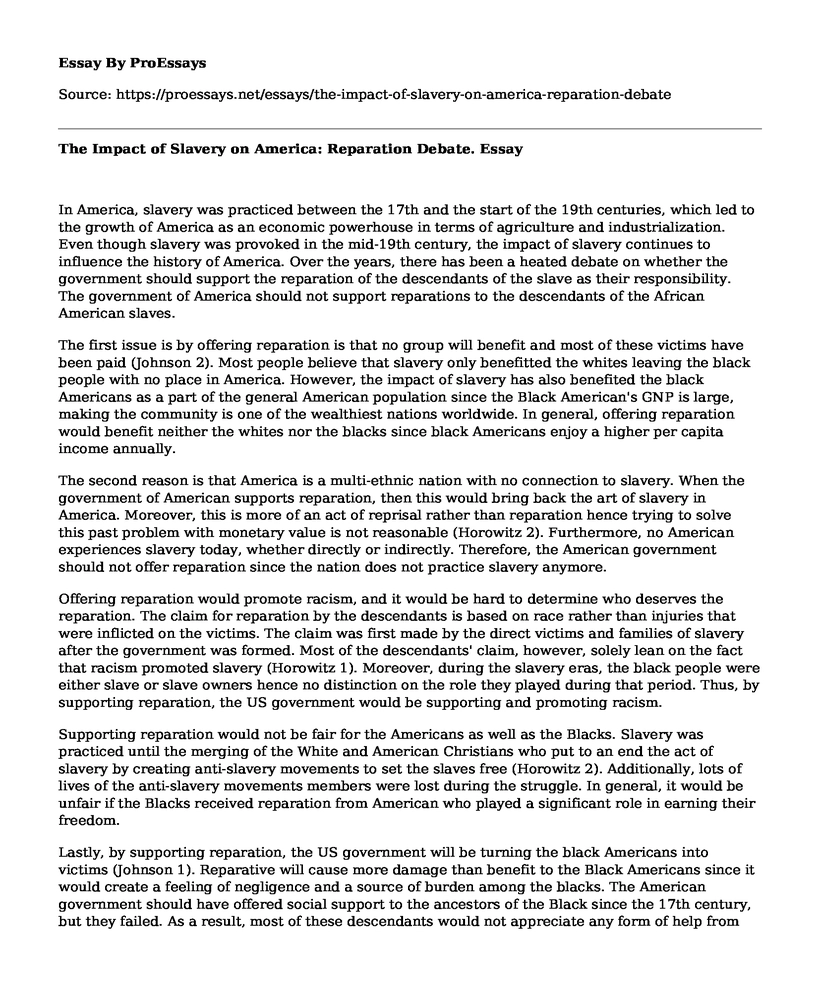In America, slavery was practiced between the 17th and the start of the 19th centuries, which led to the growth of America as an economic powerhouse in terms of agriculture and industrialization. Even though slavery was provoked in the mid-19th century, the impact of slavery continues to influence the history of America. Over the years, there has been a heated debate on whether the government should support the reparation of the descendants of the slave as their responsibility. The government of America should not support reparations to the descendants of the African American slaves.
The first issue is by offering reparation is that no group will benefit and most of these victims have been paid (Johnson 2). Most people believe that slavery only benefitted the whites leaving the black people with no place in America. However, the impact of slavery has also benefited the black Americans as a part of the general American population since the Black American's GNP is large, making the community is one of the wealthiest nations worldwide. In general, offering reparation would benefit neither the whites nor the blacks since black Americans enjoy a higher per capita income annually.
The second reason is that America is a multi-ethnic nation with no connection to slavery. When the government of American supports reparation, then this would bring back the art of slavery in America. Moreover, this is more of an act of reprisal rather than reparation hence trying to solve this past problem with monetary value is not reasonable (Horowitz 2). Furthermore, no American experiences slavery today, whether directly or indirectly. Therefore, the American government should not offer reparation since the nation does not practice slavery anymore.
Offering reparation would promote racism, and it would be hard to determine who deserves the reparation. The claim for reparation by the descendants is based on race rather than injuries that were inflicted on the victims. The claim was first made by the direct victims and families of slavery after the government was formed. Most of the descendants' claim, however, solely lean on the fact that racism promoted slavery (Horowitz 1). Moreover, during the slavery eras, the black people were either slave or slave owners hence no distinction on the role they played during that period. Thus, by supporting reparation, the US government would be supporting and promoting racism.
Supporting reparation would not be fair for the Americans as well as the Blacks. Slavery was practiced until the merging of the White and American Christians who put to an end the act of slavery by creating anti-slavery movements to set the slaves free (Horowitz 2). Additionally, lots of lives of the anti-slavery movements members were lost during the struggle. In general, it would be unfair if the Blacks received reparation from American who played a significant role in earning their freedom.
Lastly, by supporting reparation, the US government will be turning the black Americans into victims (Johnson 1). Reparative will cause more damage than benefit to the Black Americans since it would create a feeling of negligence and a source of burden among the blacks. The American government should have offered social support to the ancestors of the Black since the 17th century, but they failed. As a result, most of these descendants would not appreciate any form of help from the government. In conclusion, offering reparation would send a damaging message to the descendants of slaves rather than support.
In conclusion, slavery has impacted America since the 17th century, which has contributed significantly to its economic development. However, the government of America should not support reparation to the descendants of the African-American slaves since neither the whites nor the blacks will benefit from the reparation. Furthermore, reparation will promote racism, slavery, and victimization of the Black-American descendants.
Work Cited
Horowitz, D. (2001). Ten reasons why reparations for Blacks is a bad idea for Blacks-and racist, too. FrontPageMagazine. com, 3.
Johnson, W. (2013). King Cotton's long shadow. New York Times, 363.
Cite this page
The Impact of Slavery on America: Reparation Debate.. (2023, Jan 16). Retrieved from https://proessays.net/essays/the-impact-of-slavery-on-america-reparation-debate
If you are the original author of this essay and no longer wish to have it published on the ProEssays website, please click below to request its removal:
- Essay Sample on Criminal Defense
- Critical Essay on Racism in Brave New World
- Paper on Childhood Obesity: Local, State, and Regional Quantitative Sociodemographic, Morbidity, and Mortality Data
- Tracing the Evolution of Art: A Study of Five Art History Movements
- Essay Sample on The 'Triumph of Human Rights': International Intervention Justified?
- Uncle Tom's Cabin: Christianity, Slavery & Women's Revolution - Essay Sample
- Essay Example on Hellenistic World







